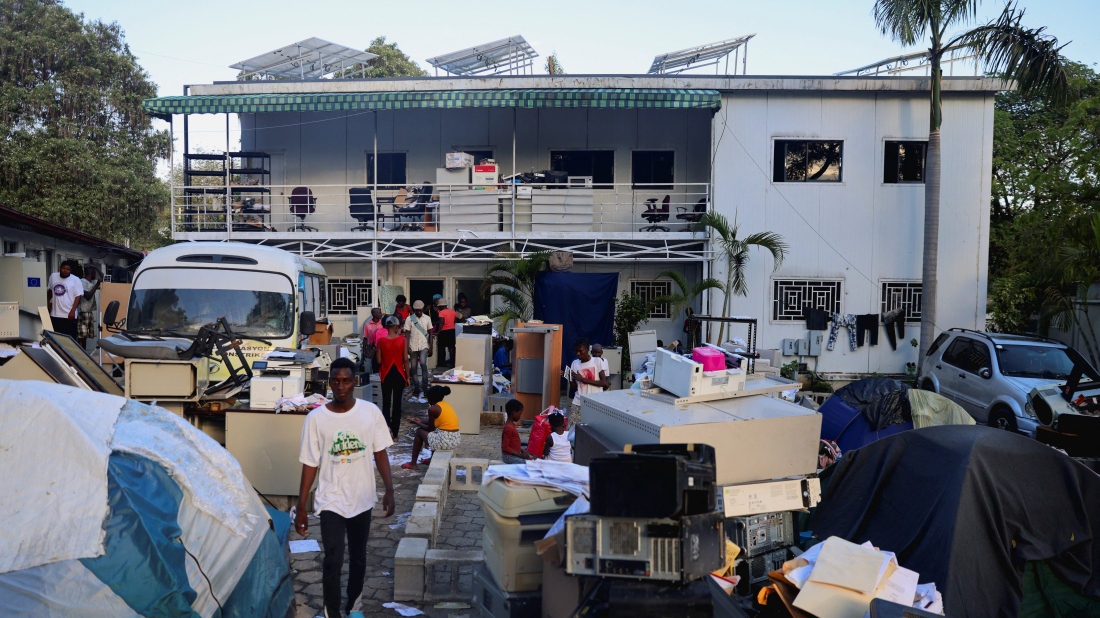Russia says 23,000 militants from 20 terror groups operating in Afghanistan
More than 23,000 militants from about 20 international groups are currently operating in Afghanistan, posing a threat to regional and global security,...

A coalition of over 60 rights organisations has signed a letter addressed to French President Emmanuel Macron demanding reparations for Haiti, whose economy was burdened for decades by a 19th-century compensation debt to France.
The letter, dated Tuesday, accuses France of extracting wealth from Haiti under threat of invasion after the Caribbean nation declared independence in 1804. France forced Haiti to pay compensation for lost “property,” including enslaved people. The so-called “double debt,” compounded by interest, was paid over more than 100 years and is considered by many in Haiti as a ransom.
According to the letter, “The wealth extracted under this ransom set Haiti's GDP growth back by decades, and resulted in a cycle of foreign aid dependence and entrenched debt that persists to this day.”
Haiti currently has the lowest gross domestic product (GDP) per capita in the Americas and is grappling with widespread gang violence, economic instability, and a lack of strong international engagement.
French President Macron had previously acknowledged the shared “painful” past between the two countries and announced the formation of a Franco-Haitian commission of historians in April. However, he stopped short of mentioning reparations.
Haiti’s Minister of Culture and Communications, Patrick Delatour, said in May that the commission’s work would begin in July. He indicated that it would aim to lay the groundwork for potential reparations.
The appeal coincides with the 200th anniversary of Haiti’s agreement to begin paying the indemnity, which has drawn renewed scrutiny from historians and activists alike.
Signatories to the letter include diaspora and reparations advocacy groups based in the United States, Africa, and the Caribbean. The demands range from direct financial compensation to the cancellation of remaining debt and support for development programmes in healthcare, education, and cultural heritage.
The Caribbean Community (CARICOM), which has taken a lead in reparations advocacy, supports Haiti’s claim and is also working with African nations to pursue broader justice from former colonial powers over the legacy of slavery.
Italy said a fond farewell to the Winter Olympics on Sunday with an open-air ceremony in the ancient Verona Arena that celebrated art and sporting achievement at a Games lauded as a model for how to stage such events.
The United States and Iran will hold a new round of nuclear negotiations in Geneva on Thursday as part of renewed diplomatic efforts to reach a potential agreement, Oman’s Foreign Minister Badr Albusaidi announced on Sunday.
Further Iran-U.S. nuclear talks are scheduled in Geneva on Thursday (26 February) as diplomacy resumes over Tehran’s nuclear programme following earlier mediation efforts. But will the talks move Iran-U.S. negotiations closer to a deal, and what should be expected from the meeting?
Mexican authorities said on Sunday that Nemesio Oseguera Cervantes, known as El Mencho and head of the Jalisco New Generation Cartel (CJNG), was killed during a military operation in the western state of Jalisco.
The European Parliament’s trade chief has urged a temporary suspension of the EU–U.S. trade agreement approval, citing “tariff chaos” following President Donald Trump’s new 15% tariffs and a U.S. Supreme Court ruling invalidating his previous global tariff programme.
Seven people were killed after gunmen ambushed a police patrol in Kohat, a district in Pakistan’s north-west near the Afghan border, on Tuesday, in an attack that comes amid rising militant violence and heightened tensions between Pakistan and Afghanistan.
Following the full-scale invasion of Ukraine on 24 February 2022, Western governments significantly expanded sanctions targeting Russia’s finance, energy, trade and technology sectors. The measures built on restrictions first imposed in 2014 following Russia's illegal annexation of Crimea.
Britain imposed its largest package of sanctions on Russia in years on Tuesday (24 February), marking the fourth anniversary of Moscow’s invasion of Ukraine, as London also announced fresh military and humanitarian support for Kyiv.
U.S. President Donald Trump’s new 10% global tariffs have come into effect, hours after the Supreme Court blocked many of his sweeping import taxes in a 6–3 ruling. Allies around the world are weighing possible retaliation, while markets brace for further upheaval.
Torrential downpours have triggered deadly mudslides and widespread flooding in southern Peru, leaving at least seventeen people dead - including fifteen killed in a military helicopter crash - as hundreds of districts across the country remain under a state of emergency.
You can download the AnewZ application from Play Store and the App Store.

What is your opinion on this topic?
Leave the first comment